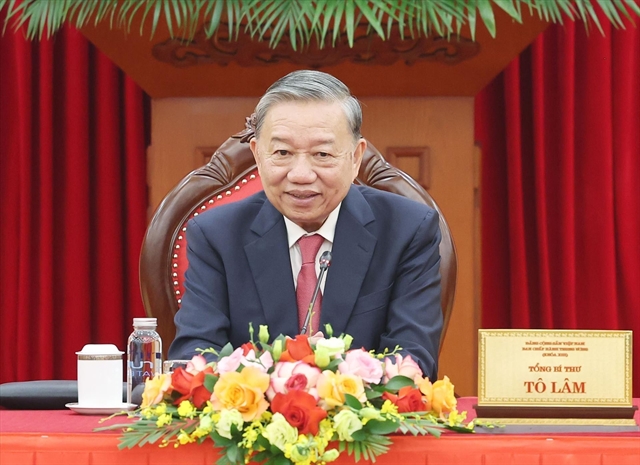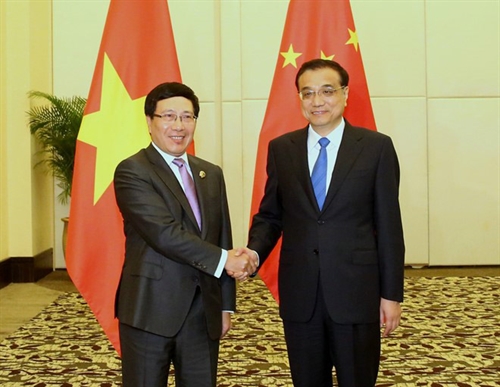 Politics & Law
Politics & Law

Deputy Prime Minister Phạm Bình Minh thanked China for responding to Việt Nam’s call to release water from Jinghong hydropower plant in Yunnan province, to provide water for emergency use by countries downstream on the Mekong river, amid the ongoing severe drought during his meeting with Chinese Premier Li Keqiang.
 |
Deputy Prime Minister and Foreign Minister Phạm Bình Minh (left) meets with Chinese Premier Li Keqiang in Bejing. — Photo VNA |
BEIJING (VNS) — The Mekong-Lancang Co-operation should promote its important role in boosting efforts by member states to scientifically and sustainably manage the water resources of the Mekong River, known as the Lancang in China, said Deputy Prime Minister and Foreign Minister Phạm Bình Minh.
Minh delivered a speech at the first Mekong-Lancang Co-operation (MLC) leaders’ meeting which kicked off in Sanya city of China’s Hainan province yesterday. Minh hailed the significance of the meeting which marks the birth of a new co-operation mechanism between Mekong-Lancang countries. It is also the first time all six countries along the Mekong River will meet to discuss joint efforts needed for sustainable development in the Mekong sub-region.
The Mekong sub-region faces numerous development and security challenges, particularly relating to environmental degradation, water resources and climate change, according to Minh.
Việt Nam welcomes and prizes China’s recent decision to increase the release of water in the upper Mekong River to address both severe drought conditions and salt intrusions in the lower part of the river, Minh said. He believes that the decision represents a good start for the Mekong-Lancang Co-operation initiative.
The Deputy Prime Minister stressed that Việt Nam supports the principles and long-term collaboration specified in the Sanya Declaration. The Mekong-Lancang Co-operation was designed around the principles of consensus, equality, mutual benefit, and respect for both the UN Charter and international law. With these values underpinning the collaboration, Minh hopes the MLC will help reinforce good neighbourly relations among the six countries, help them to implement the UN’s sustainable development goals through 2030, and contribute to deepening the ASEAN-China strategic partnership.
In his speech, Minh affirmed that a complete and connected infrastructure is essential to the development of trade, investment and tourism in the Mekong sub-region. The MLC will contribute to boosting economic connectivity in the sub-region, through development co-operation and infrastructure linkage, he said.
Economic connectivity is a priority for the ASEAN Community and for the ASEAN-China strategic partnership. Minh said that Việt Nam supports strengthening collaboration to boost production among Mekong-Lancang countries, in order to increase competitiveness of each member country and to boost production chains linking economies and strategic partners in the sub-region.
The leader also noted that among the five top priorities of the Mekong-Lancang Co-operation, co-operation regarding water resources is of primary importance.
Việt Nam has agreed to work with China to develop a joint project to establish a centre for Mekong-Lancang water resource co-operation. Việt Nam is also ready to contribute financially to the establishment and operation of the centre.
Agriculture plays a crucial role in the financial stability and sustainable development of Mekong-Lancang nations, according to the Deputy Prime Minister.
Việt Nam is willing to co-ordinate with other countries by applying new technologies faster, increasing productivity, and forming agricultural value chains in the sub-region. The purpose of these proposed initiatives is to move towards a sustainable agriculture that is both competitive and adaptable to climate change, ensuring harmony between food security and water resource security needs.
Trade, investment and tourism co-operation and connectivity are also a driving force for economic growth of countries in the sub-region, according to Minh. So Việt Nam will intensify collaboration with other Mekong-Lancang nations, to facilitate cross-border movement of trade, investment and tourism by simplifying administrative procedures.
Minh concluded his speech by emphasising that the MLC is an open co-operation mechanism, capable of supplementing current collaboration frameworks in the Mekong sub-region. This will make co-operation among the six Mekong countries even more valuable. He underlined the need for the MLC to co-ordinate seamlessly with other co-operation mechanisms and frameworks, especially the Greater Mekong Subregion (GMS) and the Mekong River Commission (MRC).
The Mekong-Lancang countries are China, Thailand, Cambodia, Laos, Myanmar and Việt Nam.
Yesterday, Deputy Prime Minister Minh thanked China for responding to Việt Nam’s call to release water from Jinghong hydropower plant in Yunnan province, to provide water for emergency use by countries downstream on the Mekong river, amid the ongoing severe drought during his meeting with Chinese Premier Li Keqiang.
Minh suggested ideas to materialise agreements reached by the two countries’ leaders, including maintaining high-level visits, increasing people-to-people friendship exchanges, and promoting the healthy and balanced development of economic, trade, investment, financial and monetary ties. He also suggested effectively implementing credit and non-refundable grants and facilitating cross-border economic development.
On sea-related issues, he expressed concern over recent developments in the East Sea and asked China to realise high-level agreements and common perceptions to manage and settle disputes in line with international law. He also prompted using the effective mechanism of bilateral talks on sea issues, joining ASEAN countries in implementing the Declaration on the Conduct of Parties in the East Sea and working towards soon formulating a Code of Conduct in the East Sea. He requested that China refrain from acts that exacerbate the current situation and properly deal with fisheries issues.
The Chinese Premier pledged to maintain high-level visits and increase people-to-people exchanges with Việt Nam, while promoting practical collaboration towards managing disputes well with a view to continuously deepening the bilateral comprehensive strategic co-operative partnership.
China was committed to continued assistance and co-ordination with relevant countries to help Việt Nam overcome drought and saltwater intrusion in the Mekong Delta, he said.
Earlier, Minh met with his Russian counterpart, Arkady Dvorkovich, during which they agreed to continue regular high-level visits to strengthen mutual trust.
They stressed the need to accelerate the ratification of the Việt Nam–Eurasian Economic Union free trade agreement and to bolster trade and investment, particularly in farm produce, industry, and oil and gas energy.
The two officials committed to working closely together and with ASEAN member states to prepare for the summit marking the 20th anniversary of the ASEAN-Russia dialogue partnership this May in Russia, creating a new driving force for ASEAN-Russia ties and for peace, stability and development in the region. — VNS